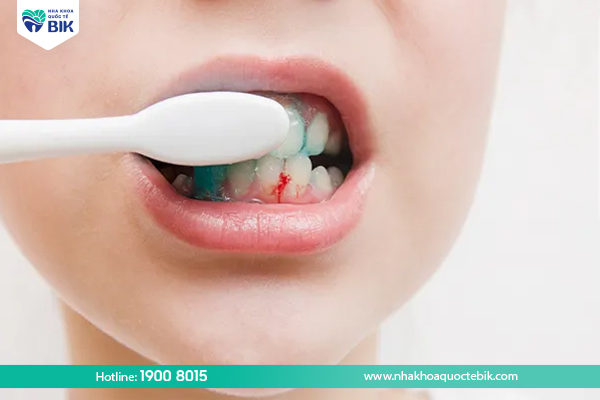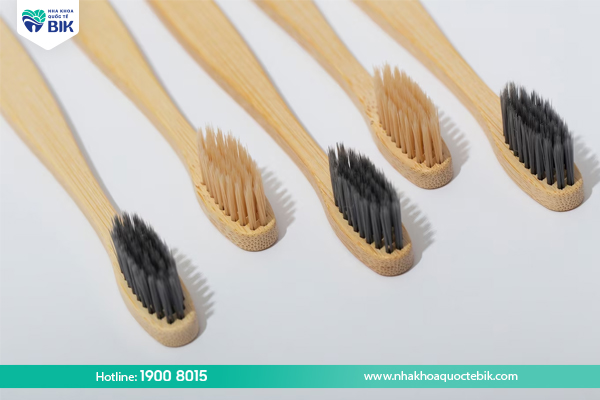
Bleeding gums is a fairly common condition but few people pay attention to it because it does not cause too much impact on health. However, if you often have bleeding gums when brushing your teeth, it is a matter of concern because this can be a sign of other serious oral diseases and if not treated promptly, it can lead to some serious complications.
1. Why do gums often bleed when brushing teeth?

Frequently bleeding gums when brushing teeth can be due to the following causes:
1.1. Periodontitis
Periodontitis is actually a more severe progression of gingivitis, which is quite common if not treated promptly. At this time, the gums become more severely swollen and sensitive to external influences, including daily brushing, leading to bleeding at the gums. In addition, infected gums cause the jawbone and supporting tissues connecting the teeth and gums to become weak, which can cause the teeth to become loose and fall out.
1.2. Tooth decay
When teeth are decayed, especially in the space between the teeth, food trapped in the cavity will cause gingivitis between the teeth. These infections will cause the gums to swell and bleed when brushing. In addition, decayed teeth will cause a feeling of pain and discomfort, and if not treated promptly, it will cause other oral diseases.
1.3. Tooth abscess
A tooth abscess is a case where the tooth is swollen and painful and pus pockets begin to appear at the tooth root. Bacteria will then begin to attack the teeth and gums, causing constant pain, bleeding when brushing, fever, and even facial swelling.
1.4. Frequent bleeding gums when brushing teeth due to pregnancy

Pregnant women often have hormonal changes that increase the risk of bleeding gums. At the same time, at this stage, progesterone is produced more, which will increase blood flow to the gums, stimulating bleeding gums when brushing teeth.
1.5. Lack of essential nutrients
In addition to other diseases, nutrients in each daily meal play a very important role in helping teeth and gums grow healthy. The cause of frequent bleeding gums when brushing teeth can be due to a lack of essential nutrients such as zinc, calcium, vitamin C, vitamin K found in foods such as eggs, milk, kale, asparagus, etc.
1.6. Using certain medications
Taking medications to treat other diseases can also cause bleeding gums when brushing teeth. Some drugs used to treat chronic diseases such as cardiovascular disease, stroke, or chemotherapy drugs to treat cancer can also cause bleeding gums.
1.7. Hard toothbrush
However, bleeding gums can also be simply due to the bristles of a toothbrush being too hard and using too much force to brush, causing the gums to be damaged and bleed. Note that you should brush your teeth properly to clean your teeth thoroughly, not with too much force.
2. Some simple ways to treat bleeding gums at home

You can apply some of the following ways to treat bleeding gums at home:
2.1. Use salt water
Salt has high antiseptic and cleansing properties, so regularly rinsing your mouth with salt water after brushing your teeth can help eliminate bacteria in the oral cavity and stop bleeding at the gums. You can dilute about half a teaspoon and a teaspoon of salt into a cup of warm water and rinse your mouth for a few seconds 3-4 times a day.
2.2. Apply ice
In fact, bleeding gums do not always originate from gum disease as mentioned above. In cases where the teeth and gums are affected by the impact of the toothbrush causing bleeding gums, you can apply ice to the outside of the bleeding area to reduce pain.
2.3. Use cinnamon
Cinnamon is also a strong antibacterial agent, helping to treat tooth decay and limit the formation of plague, preventing gingivitis. You need to mix cinnamon powder with water and apply it to the bleeding area, leave it for 2 minutes and rinse your mouth with clean water.
2.4. Use peppermint oil
Peppermint oil helps kill bacteria that are harmful to the mouth and also has the effect of effectively reducing inflammation. Use a few drops of peppermint oil to apply directly to the damaged gums and massage gently for a few minutes.
3. Prevent bleeding gums when brushing teeth

To prevent bleeding gums when brushing teeth, you should note the following:
3.1. Use a soft-bristled toothbrush
Choosing a toothbrush with a soft bristle head will help you feel more comfortable because your teeth and gums will not be affected. Besides, you also need to pay attention to choosing the right size of toothbrush so that you can easily clean deep inside the oral cavity without causing pain. Note that you should change your toothbrush every 3-4 months to prevent bacteria from accumulating and causing bleeding gums.
3.2. Combine dental floss
Dental floss is a fairly popular oral hygiene tool today, it helps to remove food debris deep inside the teeth easily. Take a piece of floss about 45cm long, wrap it around 2 fingers, stretch it and insert it into the teeth to clean. Note that you should use moderate force so that the gums are not damaged.
3.3. Regular dental check-ups
In addition to paying attention to daily oral hygiene, you should go to the dentist to have your teeth cleaned periodically about every 6 months to ensure that your gums are not infected and cause bleeding gums. At the same time, the doctor will also check the general condition of your teeth and promptly fix any problems that arise.
So frequent bleeding gums when brushing teeth can be due to the manifestation of some gum-related diseases or due to the impact of the toothbrush itself. Therefore, you should pay attention to brushing your teeth properly, and at the same time supplement the body with adequate nutrients and vitamins to limit bleeding gums.


















